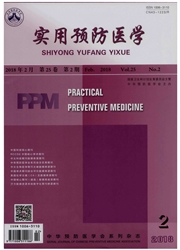

 中文摘要:
中文摘要:
目的了解医学院校学生的艾滋病知识和态度,为开展艾滋病防治工作提供依据。方法以某医科大学大二学生为调查对象,随机抽取10个班级进行调查,共计341人进行横断面现场调查。结果医学生对艾滋病的传播途径问题回答的正确率较高,超过90%,对非传播途径、艾滋病的早期临床症状问题回答的正确率较低。生源地为城市的学生得分高于农村的学生,差异有统计学意义(P〈0.05)。学校课程教育、互联网、电视、报纸杂志是学生获得艾滋病相关知识的主要途径。在对待艾滋病患者的问题上,该人群的态度较好,生源地为城市的学生得分高于农村的学生,差异有统计学意义(P〈0.05)。艾滋病相关知识得分和态度得分之间无相关性(r=0.06,P〉0.05)。结论医学生的艾滋病知识、态度较好,但仍存在不足,需要进一步开展艾滋病健康教育,尤其是农村学生的艾滋病防治知识的健康教育需进一步加强。
 英文摘要:
英文摘要:
Objective To investigate the knowledge and attitude about HIV/AIDS among medical college students,so as to provide information for HIV/AIDS prevention and control.Methods Ten classes,with a total of 341 second-year college students,were randomly selected from a medical university.An anonymous questionnaire survey on knowledge and attitudes about HIV/AIDS was conducted.Results The rate of right answers to HIV transmission routes was higher than 90%,while the rates of right answers to non-transmission routes and early symptoms of HIV/AIDS were lower.The scores for HIV/AIDS knowledge of students with urban origins were significantly higher than those for students with rural origins(P〈0.05).The main approaches for medical college students to acquire HIV/AIDS knowledge were through school course education,internet,TV,newspaper and magazines.In term of the attitudes towards HIV/AIDS patients,the medical college students had good performance,and those with urban origins got higher scores than those with rural origins(P〈0.05).No correlation was found between HIV/AIDS-related knowledge score and attitude score(r=0.06,P〈0.05).Conclusions The knowledge and attitude of medical college students towards HIV/AIDS still need to be improved.It is urgent to further strengthen HIV/AIDS health education,especially education on knowledge of HIV/AIDS prevention and control targeting rural students.
 同期刊论文项目
同期刊论文项目
 同项目期刊论文
同项目期刊论文
 Factors associated with unprotected anal intercourse among men who have sex with men in Liaoning Pro
Factors associated with unprotected anal intercourse among men who have sex with men in Liaoning Pro Factors associated with HIV infection among men who have sex with men in Henan Province, China: a cr
Factors associated with HIV infection among men who have sex with men in Henan Province, China: a cr Reliability and Validity Testing of the SF-36 Questionnaire for the Evaluation of the Quality of Lif
Reliability and Validity Testing of the SF-36 Questionnaire for the Evaluation of the Quality of Lif 期刊信息
期刊信息
